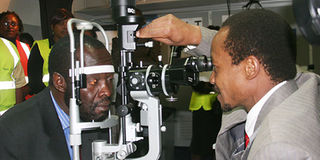Eye flying hospital lands in Nairobi

Medical Services minister Anyang’ Nyong’o (left) has his eye checked in the plane by Dr Michael Gichangi, head of eye division at the ministry. The DC-10 jet has been converted into an eye hospital and has operating rooms. Photo/PETERSON GITHAIGA
A unique flying eye hospital touched down at Nairobi's Jomo Kenyatta International Airport on Wednesday; and the first patient was Medical Services minister Peter Anyang’ Nyong’o. On Thursday, the flying hospital will offer free eye treatment to patients who will be ferried from Kenyatta National Hospital to the country’s premier airport.
The Orbis Flying Eye Hospital brings together eye care professionals and aviators to give the gift of sight to people in developing countries around the world. Onboard the refurbished DC-10 jet, local doctors, nurses and technicians will work alongside Orbis international medical team to exchange knowledge and improve skills.
Teaching hospital
The mobile teaching hospital is a unique tool in the fight against preventable blindness in developing countries. In the 48-seat classroom at the front of the plane, doctors gather for lectures, discussions and live broadcasts of surgical procedures being performed nearby in the Flying Eye Hospital operating room. If needed, operations can also be broadcast to an additional classroom outside the aircraft, for instance, at a nearby hospital.
The World Health Organisation estimates that 45 million people are blind worldwide, yet an estimated 80 per cent of the blind suffer needlessly. Millions could be cured because their blindness is caused by conditions that are easily treatable or preventable. At the invitation of the ministry, Kenyatta National Hospital and University of Nairobi, Orbis International dispatched its flying hospital for a two-week treatment and training programme.
When their mission ends on June 12, they hope to have seen 100 patients whose conditions are relevant to that programme. The patients are pre-selected by local doctors. The selected patients are then screened by Orbis volunteer faculty members at the programme site.
Priority is given to children, individuals who are bilaterally blind and cannot afford surgery, and represent good teaching cases. Local doctors maintain oversight of patients before, during and after surgery.
Conditions Orbis International will treat include cataract, childhood blindness, corneal blindness, diabetic retinopathy, glaucoma and trachoma. Orbis experts will also train local doctors in oculoplastic surgery, which includes repair of the eye socket (orbit), eyelids, and tear production and drainage.
Conditions that commonly require oculoplastic surgery in developing countries include drooping upper eyelid (ptosis), scarring of the upper eyelid caused by trachoma, age or trauma, which prevents the lid from covering the entire eye, blocked tear ducts, fractures to the bones surrounding the eye (socket or orbit), tumours within the orbit, eye or tear gland or pressing against the eye (orbital tumour). Other procedures include placement of an artificial eye (prosthesis) when eye removal is necessary.
Since its first programme in 1982, the Orbis Flying Eye Hospital has travelled to more than 70 countries and saved the sight of millions. Building the local capacity will include training eye care professionals and health workers, introducing ophthalmic technology and related management systems, improving quality and accessibility to eye care, increasing public awareness about eye health and the prevention of visual disabilities.
Orbis representative Perry Athanason said there was an urgent need to improve eye care services and supportive policies. He said their invitation by the Ministry of Medical Services together with Kenyatta National Hospital and University of Nairobi persuaded them to bring the flying eye hospital containing a state of the art surgical and teaching facility.
Two-week training
Orbis has worked in Uganda, Tanzania and Ethiopia. It was formed in 1982. The two-week training targets professionals from several prominent eye hospitals responsible for providing the surgical and clinical components of the university resident programme. The focus of the training will be to increase the ability of consultant opthalmologists, nurses, anaesthesiologists, biomedical engineers and technicians.
Dr Michael Gichangi, who is coordinating the programme, said training would concentrate on neglected areas like glaucoma, paediatric cataract surgery, squints, laser treatment for diabetic eye disease and cornea transplants. He said Orbis is willing to support vision 2020 regional workshop in Kenya where countries in the region will share their strengths and challenges in blindness prevention.




